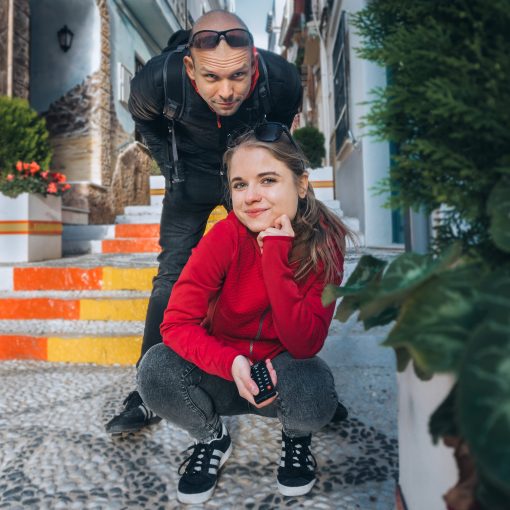We still remember the feeling of excitement when we were finally preparing for full time travel as digital nomads. There was some stress involved as our to-do list was constantly growing. For us, it was a big shift from our mostly stationary life thus far. We already had quite a lot of experience with short-term traveling, but preparing for full time travel was a completely different venture. Luckily, after over a year of traveling full time, we can safely say that it was the best thing we did so far! For sure preparing for this kind of adventure doesn’t end with packing needed stuff into the backpack. There are a lot of other things that need to be taken care of.
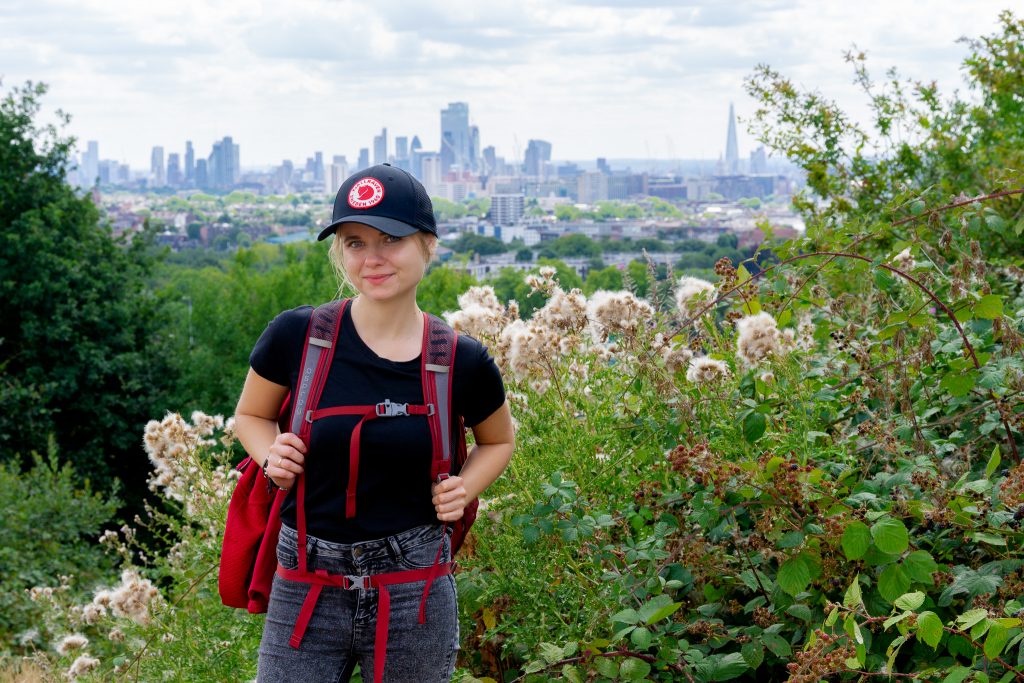
This website uses affiliate links thanks to which we may earn a commission for purchases you made at no additional cost to you. If you like the content, consider using those links to support us. Thank you!
How to prepare for full time travel as a digital nomad?
To make it clear just from the start, we’re digital nomads and we’re slow traveling, currently by car. It means that we’re staying in one place for a few weeks, working during the week and on the weekends exploring the area we currently are in. For us, a long trip means at least a couple of months but closer to a year. This doesn’t mean that if you aren’t planning to travel like us, or even if you aren’t a digital nomad, then you won’t get anything from this post. On the contrary, stick for a bit and the chances are high that you’ll learn at least one new thing today!
Since we started the whole journey we’ve been preparing for full time travel only once (well, technically twice if you count our “return to the base to restock” after a year). But if you take into consideration that we’re switching places every other 1.5 months we have done a fair bit of packing/unpacking cycles already. Since the beginning, we’re constantly learning what we need, what is actually useful to have, and what we can live without. Keep on reading and discover our tips on how to prepare for full time travel as a digital nomad and let our experiences make your life easier.
How to prepare to have a peaceful mind during full time travel as a digital nomad?
Take care of your health
One of the first steps in preparing for long-term travel should be taking care of your health beforehand. There is nothing worse than spending your long-awaited trip in a hospital or being sick in bed. Minimize the chances for it to happen by maximizing your health by eating properly, exercising, and sleeping well. Before leaving it would be great to do a full blood test to check the state of your health, and visit doctors you go to regularly to consult how to properly handle your travel plans health-wise. Depending on the destination, it may be a good idea to visit a travel medicine clinic to get the vaccinations you might need as well.
Prepare yourself financially
This is probably the most important aspect of preparing for a long-term trip. Do you know where you’ll get the money from? Did you save enough and will you travel burning savings only? Will you live a digital nomad life and work remotely during your adventures? Or you’ll take odd jobs here and there, or maybe be volunteering? If you already know the answer to that – that’s amazing, good for you! If not, we urge you to seriously think about it. It’s better to be prepared with even multiple options than later be sorry and broke. If you want a bit of inspiration take a look HERE and HERE where we asked our traveler friends how to make money for and while traveling.
Get an appropriate credit/debit card
In the modern world traveling without a credit/debit card might be bothersome and if by any chance you don’t have one, we advise you to get at least one. You need to decide what credit card you would like to use during your travels. You can choose one of the travel cards like Revolut or Wise, or check if by any chance your bank doesn’t offer an account with good currency-exchange options. There are still places that aren’t accepting debit cards, for example, to rent a car in many car rentals you’ll need a credit card.
Get another credit/debit card from a different card association
It’s always good to have at least two cards from different card associations: one Visa and one Mastercard, or others. You never know when one card will be declined/lost/stolen (and believe us, it happens sometimes) and the other one will save the day. We travel with two Visa cards from Revolut which we use on a daily basis, and two Mastercards from our bank. Tip: don’t put all the cards in the same place!

Get your cards into your smartphone
It’s also a good idea to have your credit cards connected to your smartphone for easy contactless payments. It would work as another card backup as well. But remember that not all places have the ability to pay wirelessly and physical cards may still come in handy sometimes.
Notify your bank about the travel
You want to notify your bank that you’ll be using your card abroad. It’s highly possible that they will temporarily block your card if they detect a suspicious transaction (unusual place/amount) until they confirm it’s you who did it. It’s a normal fraud detection policy so don’t be angry that they are trying to save you from losing money.
Check the visa requirements of your travel destination
Never ever forget to check the visa requirements of your destination before you hit the road. Sometimes you won’t need any (for example if you are an EU citizen traveling in the EU), sometimes you’ll need to apply for a visa in advance, and sometimes you’ll be able to deal with it upon arrival to the country.
Get a valid passport
The famous “Passport six-month rule” says that your passport must be valid for at least another 6 months. Depending on the country you’re traveling to, the six-month period may begin from the date you leave that country or the date you arrive. However, in some countries, you need a passport with a three-month valid duration period. Generally, requirements change based on where you are traveling. Here you can take a look at the requirements for every country. So if your passport is gonna expire soon, better replace it right now.
Get an International Driving License
If you are planning to drive a car or a motorcycle you might need an International Driving License. Depending on where you are from and the countries you’ll be traveling to it may be required. Research that and get one if needed. There is no harm in getting one anyway so you might as well get one to be perfectly safe!
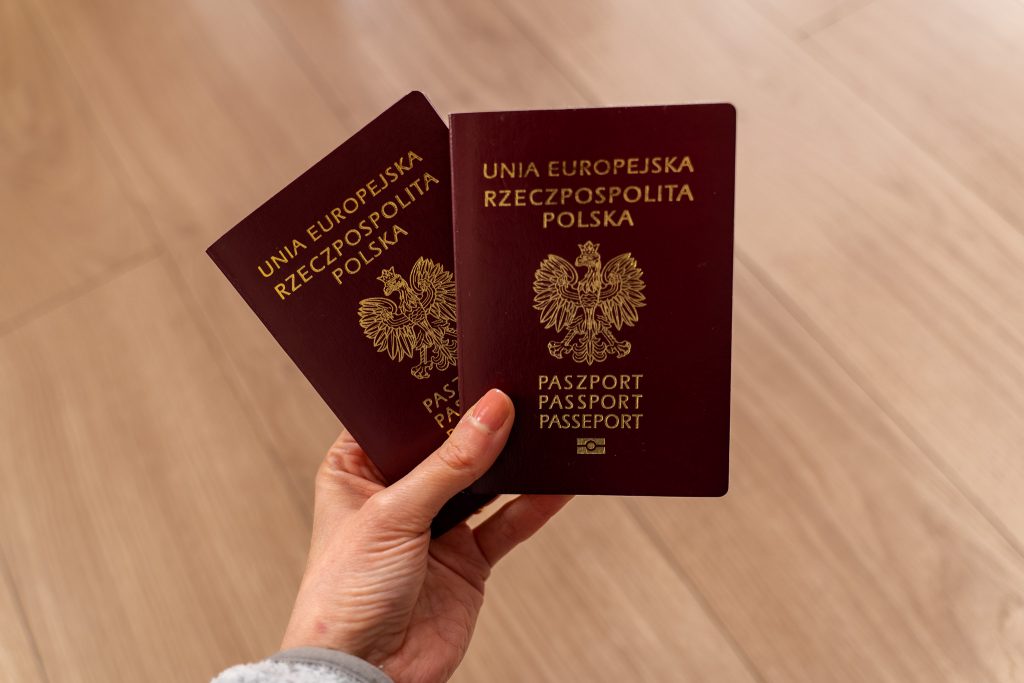
Ensure that you have a passport with enough visa pages
Be sure to have enough free pages in your passport for stamps as many visas also come in the form of passport stamps. If you are new to traveling you should be good as your passport is probably blank but if you travel frequently it would be a good idea to check the amount of remaining blank pages in it and get a new passport if needed.
Make copies of your documents
Original documents can be lost or stolen, so it’s good to have copies of them with you. Scan your passport, ID card, and driver’s license and safely save them in multiple places. Phone, encrypted flash drive, and in the cloud (Google Drive, iCloud, Dropbox, etc.). Generally, somewhere where you can access them easily from your phone or laptop. Also, print them and keep them in a separate place from the original ones. Better safe than sorry, right?
Buy travel insurance
Our advice for you is: never ever leave the country without travel insurance. Many already thought that they don’t need it, and some of them are now drowning in debt. Yes, chances are high that nothing bad will happen but what if? Accidents and illnesses happen. You can catch some virus or bacteria and have to spend a week in the hospital, break a leg, or have an unfortunate accident in which you can even die. Proper travel insurance will give you peace of mind and protect you (and your family) from financial problems in case something goes wrong.
If you’re from one of the EU countries (and insured in your residential country) you can also use a free EHIC card (European Health Insurance Card) to receive treatment in another member country for free or at a reduced cost, if that treatment becomes necessary during your visit.
Write down useful contacts, in case of emergency
To be prepared for the worst (that hopefully will never come), search, save, and keep important numbers in a place where you’ll have easy access to. Numbers to the embassy and emergency numbers to police, ambulance, and fire brigade. In the EU it’s a bit easier as you only need to remember 112 which will connect you with the emergency call center. Comes in very handy while in a stressful situation.
Create an electronic signature
When you are far away and there comes a need to sign something, an electronic signature comes in very handy. It’s valid from the legal standpoint as your own handwriting and it’s a no-brainer if you travel a lot. If you run a company it’ll probably be a must for you, as you never know when some important documents, deals, or contracts will pop up to sign immediately.
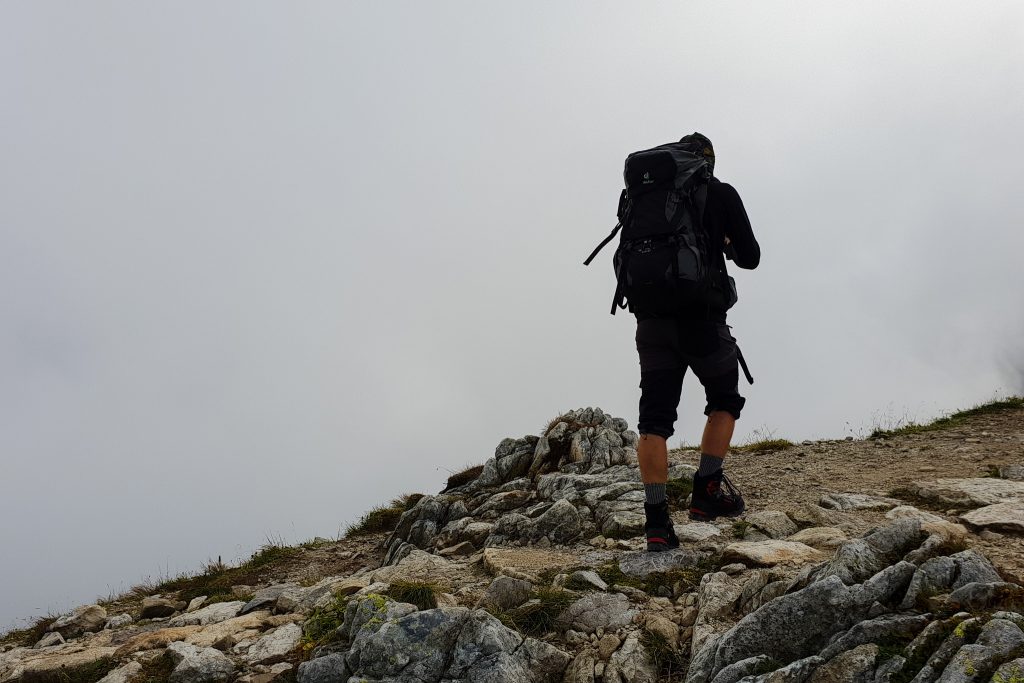
Check out what other travelers have to say about traveling 🗺️
How to prepare to leave things behind to enjoy full time travel as a digital nomad?
Prepare to move out of your apartment/house
First, you’ll need to figure out what to do with an apartment/house you’re currently living in. There are different options depending on if you rent it or own it. If you rent, just terminate the contract and you’re done. If you own a place you can just leave it be, or consider letting it while you won’t be there to earn extra money at the same time. Remember that an empty apartment can still generate liabilities that you would need to pay. Similarly, if you’ll let it you’ll need someone on-site to handle anything that may need to be taken care of. In both cases it’s an additional thing that can impact how much you’ll enjoy the trip.
Terminate the contracts and subscriptions
Don’t pay for something you won’t use and terminate all unnecessary contracts and subscriptions. It might be TV, Internet, Netflix or any other streaming service, gym pass, or cinema pass… Think about things you pay monthly and get rid of the ones you won’t be using. Extra money for your travels!
Decide what to do with your belongings
Don’t forget to think about what you’ll do with your belongings that won’t travel with you and where you’ll store it. How you’ll handle that also depends on whether you own your place or rent one. But in general, you can use your own place, ask friends or family, or just rent a garage or storage unit to house the stuff you’ll need when you’ll get back. In any case, we recommend going through all the things and getting rid of the unnecessary ones just to make it easier to manage and to minimize the amount of space needed for it.
How to prepare the crucial stuff for your full time travel as a digital nomad?
We’ll be honest with you – our first attempt to pack everything we need was a failure. We managed to fit everything into our car but it turned out a few weeks later that we were overpacked by a lot! Funny thing is that we sold/left 80% of our belongings before leaving and thought we took only the most important ones. During the first few months, we threw out or changed at least half of the “necessary things” that turned out to not be that necessary or too big.
It seems that each time we’re switching places and doing the packing/unpacking dance we still get rid of various things. But currently, everything we need finally fits into 2 big backpacks and 2 smaller ones. It includes clothes for any weather, cosmetics, medication, and electronics gear. We also have one more in which we transport food, a water filter, and… plush toys. 😉 We can easily fit all of that in a 450L trunk with a bit of room to spare still.
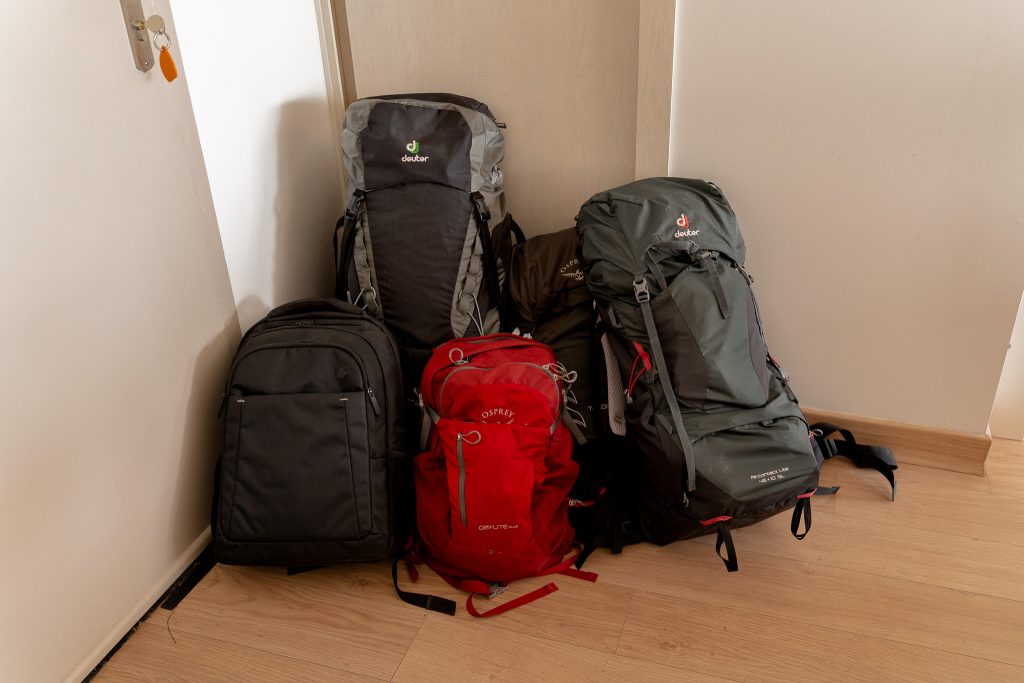
How to prepare and pack properly for full time travel?
Try to pack as light as possible. Taught by experience, we believe that almost the same amount of things are needed for a year as for a week of travel. Be relentless with minimizing the stuff you think you’ll need. Observe what you are really using daily and take only that. If it happens to be big or bulky and you can’t live without it try to find a smaller replacement.
What didn’t work in our case? For example, we started with normal cotton towels (1 took the same amount of space as 4 from microfiber), a regular-sized router (now we have a travel one which is 4 times smaller), and way too many “regular” clothes (we reduced the amount and switched to merino). We also took yoga mats, which we never used, and a soundbar because we thought we needed a proper sound with us always.
What tech to pack?
It really depends on what you need. General tips from our experience would be to have electronics of good quality so the chances for it to break will be minimized. Try to have redundancy in the stuff you have so you can manage when something will break. For example, have at least two ways to charge your devices, have multiple cables of the same kind, or multiple devices where you can do the stuff you need. It’s also good to have it all in the smallest form factor that you can live with to minimize the space needed. And believe us small but functional is better than big and clunky while traveling. And of course, don’t forget to take a power cord and some travel adapters so you won’t be taken by surprise by weird-looking wall sockets and without a way to charge everything.
What clothes to pack?
As for clothes we recommend buying less but of better quality, as they will last longer and take up less space. Now we’re testing various clothes made from merino and so far love them! They look good, take up less space and you can wear them longer without the need to wash them.
What else to pack?
From our experience, it’s good to have something which will make each new place a bit homier. We tried our favorite ceramic Harry Potter mugs but those were not that easy to transport and could break easily and now we travel with already mentioned plush toys only. Pick something that will work for you, but we definitely recommend taking at least one thing that will make you feel good in each place.

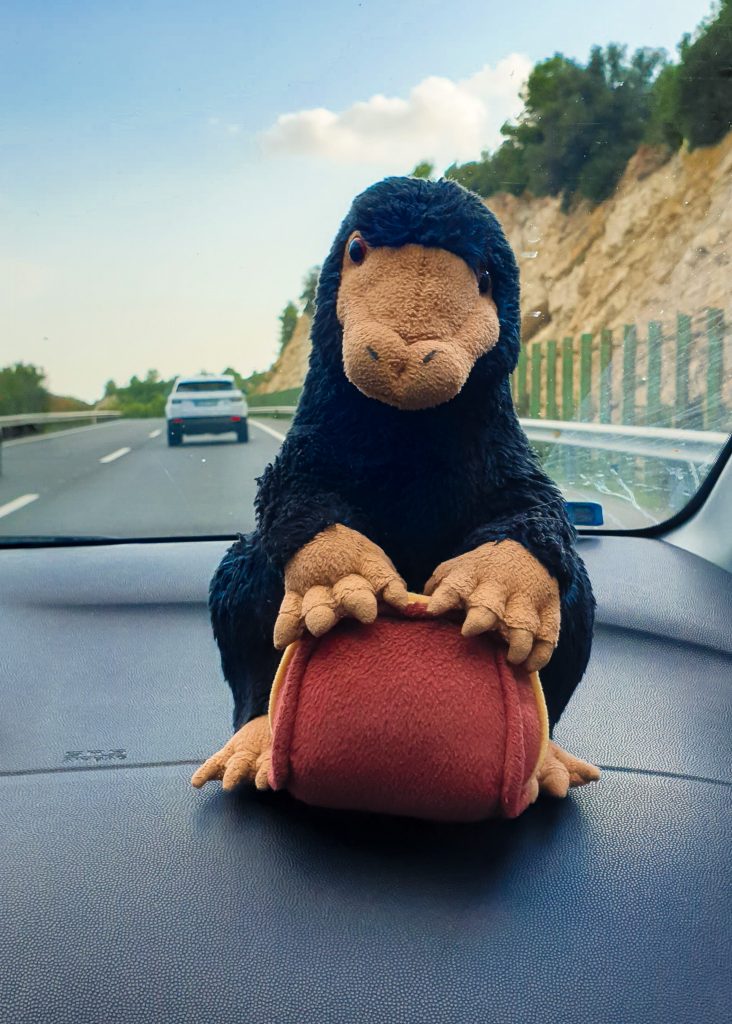
Stock up on medication
We’ve already touched upon health earlier but anything can happen. Of course, no one likes to get sick, especially while traveling, but it’s better to be prepared for that as well. We prefer to have with us medications we know and trust, at least at the beginning. So stock up on some trusted medications for headaches, colds, stomachaches, diarrhea, and other along with the regular first aid kit stuff. Our travel first aid kit has helped us already many times and for sure will help us in the future.
Also, if you’re taking any medication regularly, remember to bring the appropriate amount you’ll need during your long-term trip. Go to your doctor, ask for a prescription and buy meds for the entire trip if you can.
Get your vehicle ready (if you’ll travel by one)
This one is for those who will be traveling on wheels, just like we do. We probably don’t need to tell you about obvious things like taking a vehicle to the mechanic and technical inspection and buying insurance.
What you might not know, and what also surprised us a little, is that each country has its own requirements on mandatory equipment for your means of transport (be it car, motorcycle or something else). So check out what you’ll need in the countries you’ll travel to, and buy missing items. We for example had to buy a second triangle and reflective jackets as those aren’t needed in Poland.
How to prepare and survive the first weeks of full time travel as a digital nomad?
Doing something for the first time can certainly be intimidating. If you’re getting out of your comfort zone it’s a good idea to make as many things as smooth as possible. That way you can ease into the new and enjoy it more. In the case of traveling, you can do a few things to get better prepared.
Plan the beginning of your trip
Roughly prepare yourself for the first days/weeks of your trip – book your first flight and first accommodation. We know it might be hard and much depends on your travel style but it’s good to have a safe harbor at the beginning when everything is new and might be quite chaotic.
Research the country you’ll visit
Always research and find out more about the country you are going to travel to. Here we don’t only mean visa requirements or currency but also local culture and customs. It’s good to know what to expect and how to behave to not make a faux pas in a totally new place.
Learn a language (at least a bit)
It’s also great to learn some basic words and phrases in spoken language – it’s a simple thing but might open many doors. But don’t worry if you don’t know any – we’ve been in situations where only body language and gestures got us through.
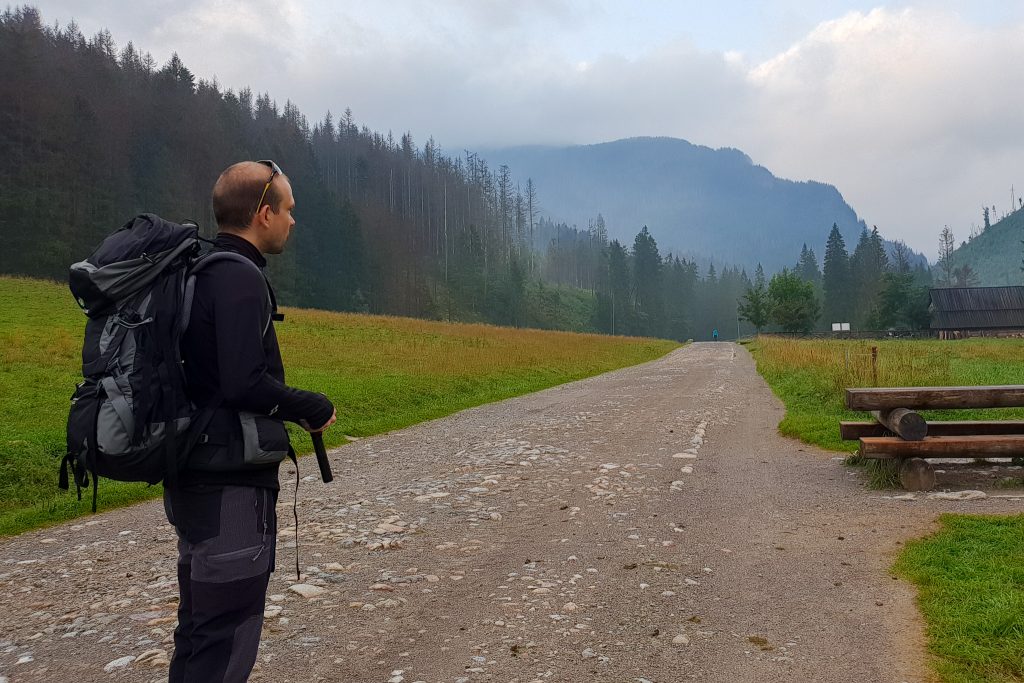
Download useful travel apps
Which ones you’ll need will much depend on your travel style and the places you’ll travel to but in our opinion, Google Maps (with offline maps downloaded to save data) and Translate (live translation feature is awesome!) are a must. Don’t forget about bank applications to have access to cash always. VPN also comes in very handy, especially while connecting to wifi in public places to protect your privacy.
Do a test run or even a few
If you are not sure if you’ll like the new way of exploring the world you can always take it slow and do a short test run, or few, in your own country or abroad. That way you can easily check if it’s something that you’ll like, what stuff is really crucial for you, what you can live without, what is your preferred way of travel and many more. You’ll definitely learn something new with each trip.
What do you still need to take care of during full time travel?
Fortunately, the worst is behind you so now you can hit the road! But there are still some things that you can’t forget while traveling long-term. For sure you’ll need to take care of the continuity of health insurance, pay the bills, and deal with some legal stuff like tax residency and registration if you are staying for longer in one place. Also, don’t forget about visas and stick to the allowed number of days in each country.
Oh, you’ll also need to take care of your head and mental health. Burnout is a real thing, especially when you travel nonstop. So don’t forget to take care of your head and rest when you feel like it’s too much. Don’t push yourself too hard.
How to prepare for full time travel? – Summary
Lots of things to do and take care of, right? As you can see, preparing for long-term travel for sure doesn’t happen overnight. It’s a long process, which can take even a few months. We’ve already been through it all and we know it can be exhausting. But it was all worth it and we don’t regret going through it. After all, we’re enjoying the second year of our digital nomad journey now and we can’t get enough! Hope that this post will help you prepare for long-term travel, to start your own amazing journey. Feel free to use it as a checklist of some sort to not forget about anything important. Good luck & see you on the road!
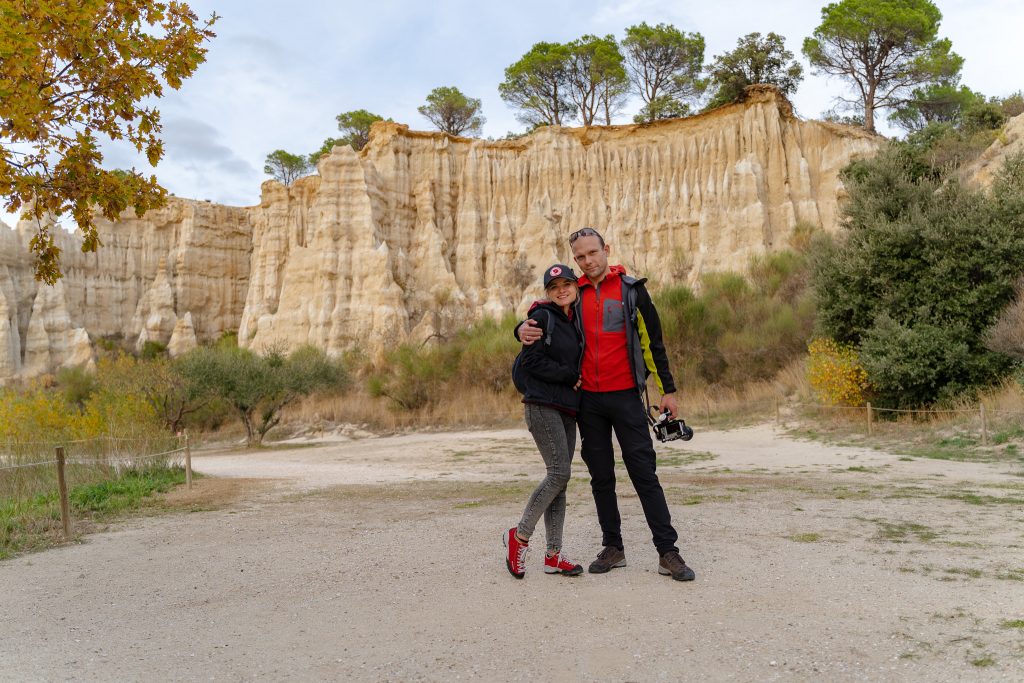
Want to know more about slow traveling?
You may also be interested in these posts:- Retrospective On The Second Year Of Living As Digital Nomads
- Driving In Europe - Everything You Need To Know
- How to work remotely and travel long-term?
- Best Well-Paid Remote Jobs For Digital Nomads
- Travel Slow Or Travel Fast - Which One Is Better?
- Retrospective On The First Year Of Living As Digital Nomads
- 20 Reasons Why You Should Experience Slow Travel
- Slow Travels With Remote Work: Challenges, Myths, Pros, Cons
- What Is Slow Travel? - 101 For Beginners





